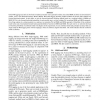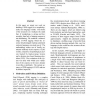23 search results - page 3 / 5 » Chinese Word POS Tagging with Markov Logic |
LREC
2008
13 years 7 months ago
2008
Part-of-Speech tagging is generally performed by Markov models, based on bigram or trigram models. While Markov models have a strong concentration on the left context of a word, m...
LREC
2010
13 years 7 months ago
2010
In the POS tagging task, there are two kinds of statistical models: one is generative model, such as the HMM, the others are discriminative models, such as the Maximum Entropy Mod...
NLE
2008
13 years 6 months ago
2008
Words in Semitic texts often consist of a concatenation of word segments, each corresponding to a Part-of-Speech (POS) category. Semitic words may be ambiguous with regard to thei...
NAACL
2003
13 years 7 months ago
2003
Homograph ambiguity is an original issue in Text-to-Speech (TTS). To disambiguate homograph, several efficient approaches have been proposed such as part-of-speech (POS) n-gram, B...
ACL
2006
13 years 7 months ago
2006
In this paper we report our work on building a POS tagger for a morphologically rich language- Hindi. The theme of the research is to vindicate the stand that- if morphology is st...


